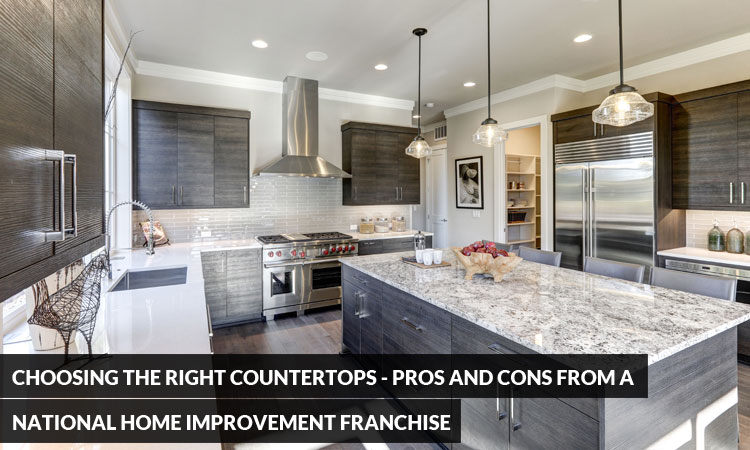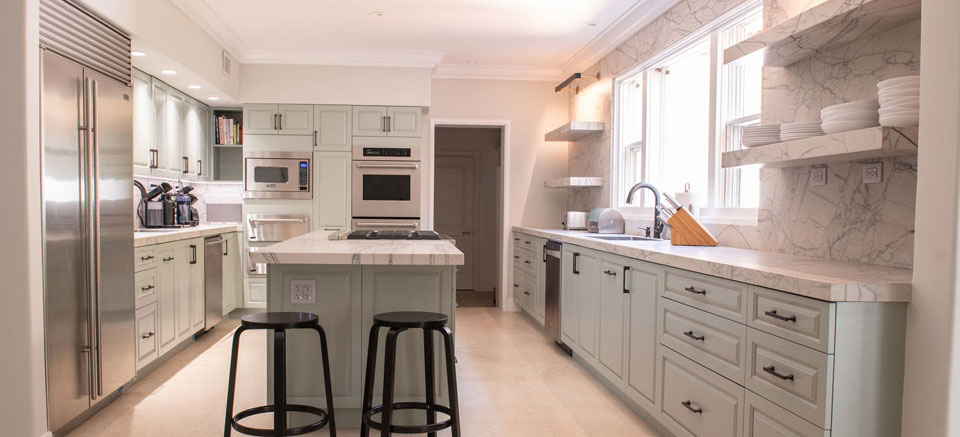Choosing the Right Countertops: Pros and Cons from a National Home Improvement Franchise

When trying to make the most of your kitchen or bathroom remodeling project, success often boils down to how you handle your countertops. Because everyone has different tastes and budgets, choosing the right ones is a highly personal matter, and one-size-fits-all recommendations are simply impractical. Ultimately, the choice is yours to make, but it’s always a good idea to research the pros and cons associated with different material options.
In today’s post, experts from our home improvement franchise weigh in on the pros and cons of different countertops. Read on for information about 4 different countertop options to help you make an informed decision about this bath or kitchen centerpiece.
Granite Countertops
Granite is what it sounds like: an artfully cut hunk of rock!
- Pros:
- Granite countertops are as beautiful as they are unique. The mottling of each granite slab creates inimitable colors and patterns that will make your kitchen or bathroom one-of-a-kind.
- Granite countertops are also very resistant to wear and tear, standing up well to splashes, knife nicks, and heat exposure.
- Cons:
- Like most stone, granite needs to have sealing treatments applied every so often to stop stains from penetrating.
- Though each slab of granite is unique, customization is limited and expensive.
- Granite is extremely heavy compared to other materials, which means that your kitchen or bathroom countertops will need very sturdy cabinets to support their weight.
- At $35-100 per square foot, granite is rather expensive.
Solid Surfacing
Solid surfacing is made primarily from acrylic and polyester materials. It is produced across the country, making it readily available, and is an option that has been consistently popular through the years.
- Pros:
- Solid surfacing is totally non-porous, which makes it incredibly low-maintenance. You will never have to worry about sealing or special cleanings.
- Nicks and gouges in your solid surfacing can easily be sanded out.
- Solid surfacing is offered in a wide range of colors and patterns.
- Cons:
- Solid surfacing has a distinctly unnatural look. This can be a boon for homeowners who want bold, modern looks, but may not suit those who want a more naturalistic vibe.
- Though it is easily repaired, solid surfacing does not hold up well to scratches and cuts.
- Solid surfacing is rather expensive, being roughly on par with granite.
Quartz Surfacing
Quartz is made using resin and quartz chips tinted with color. This countertop option is sometimes referred to as engineered quartz, or engineered stone. Most people think of quartz countertops as a reasonable middle-ground between the beauty of granite and the easy upkeep of solid surfacing.
- Pros:
- Quartz surfacing is comparable to solid surfacing in terms of upkeep and its resistance to wear-and-tear.
- Unlike real granite, quartz surfacing is available in a wide range of colors and patterns.
- Cons:
- Quartz surfacing lacks the natural variegation of granite, making it an imperfect solution for homeowners trying to create a “naturalistic” aesthetic.
- Quartz surfacing can be pricey at the “low-end,” but it is cheaper at the premium end compared to granite and solid surfacing.
Marble
Luminescent with distinctive veining, marble is the traditional choice for homeowners who want a glamorous look.
- Pros:
- Marble is unmatched in terms of sheer elegance.
- Marble stands up exceptionally well to heat, making it a great option for busy bakers!
- Cons:
- Marble is vulnerable to stains, even when sealed.
- Like granite, marble is heavy, which demands certain cabinet conditions.
Learn more about countertop options and get access to exclusive catalogues at https://www.kitchensolversfranchise.com.
Back




